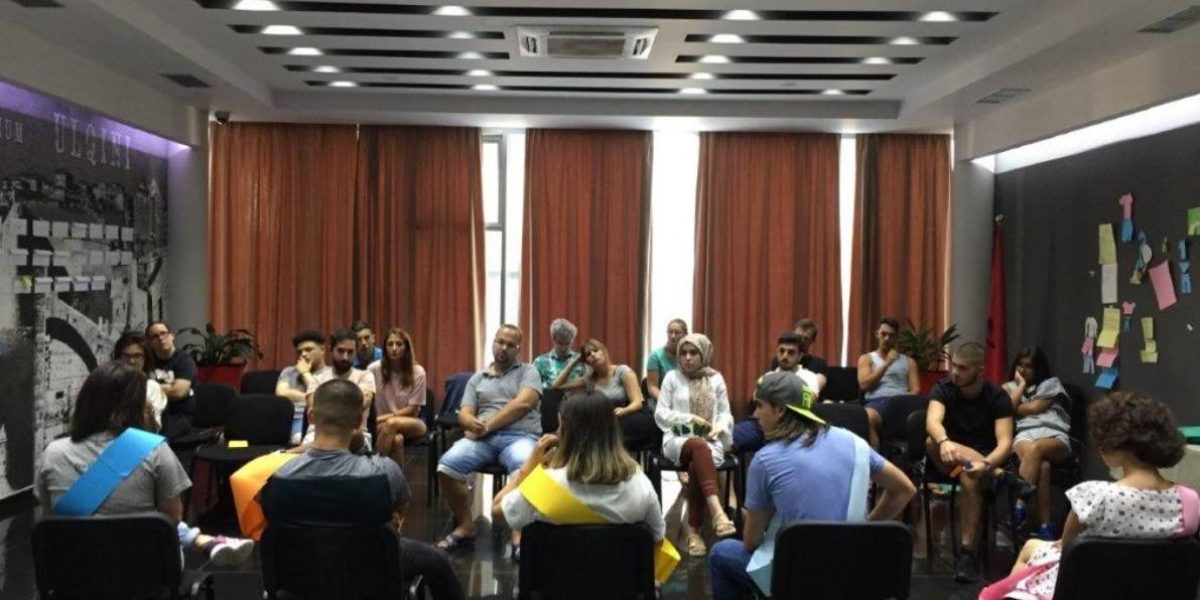
Activity 1 – training course
The first Mobility of the project is this activity Mobility of Youth Workers-training Course which was held in Durres Albania from 7 till 15 December 2017, in AS Hotel in Durres. In total 32 participants from 8 partner organisations, 4 trainers and facilitators and 3 staff were part of the project.
The training focused in exploring social exclusion in each country and learning how to address social inclusion through tools of multimedia and theatre of the oppressed.
During the training week, Participants had the opportunity to learn through non-formal education, to get acquainted with different digital applications, to learn how to take photos and make video editing, to get acquainted with the theater of oppressed theater as well as to discuss topics which affect them every day.
During the work in the youth groups, they worked to create a set of promotional videos with themes of inclusion, while at the same time staging some parts through the theater of the crowd, targeting phenomena such as bullying, social pressure, discrimination, etc. This kind of theater is in educational methodology that allows young people to become actors and spectators at the same time and to discuss there phenomena of oppression that disturb them in their daily life. After staging a part with several acts, the public is invited to change the actresses to provide an alternative resolution to the scene conflict. So they take on the role of the actor and reflect on the different solutions to a problem as they act. This methodology is already well-known across Europe and Youth4Society brings it combined with multimedia and various video and video editing techniques by the young people themselves.




Activity 2 – Youth Exchange
The Youth Exchange was implemented in 10-17 February 2018,
Sabac, Serbia. Each partner organization sent 4 participants (2 young people with fewer opportunities in each group) + 1 youth leader.
The main aim of the youth exchange was to bring together young people from partner organisation to explore the topic of social exclusion using theatre and multimedia tools for social change.
One youth worker trained in 1st activity came as leader from each group creating continuation of the action, transferring the Know How and multiplication of the experience.
This Youth Exchange was the place of diversity of youngsters from different cultures, backgrounds, countries and we saw that, this was the best setting for forming scenarios and learning together.
The event of the YE was leaded from one of the youth workers who attended the training event, which means that he had the right expertise to implement a successful activity.
All activities were fully based on the principles of NFL and learning-by-doing. Collaborative work was another core element of the YE. Participants were engaged in peer-review activities and discussion groups.
Creative acting and spontaneous techniques helped to look for innovative solutions, team-builders and energizers ensured positive, open and safe atmosphere.
Participants then moved on to work with a set of hands-on tasks designed around realistic scenarios, which provided practical experience of using theatre and multimedia tools in a context that simulated real work environments.
Participants used multimedia tool and produced concrete products with videos registered during the “theatre” scenes.




Activity 3 – The Seminar
Seminar was organized in 10-16 September in Durres, Albania and each organization sent 3 participants, 3 facilitators/reporter (UK, Albania and Italy) and 1 staff. Seminar was focused in discussing different tools used in youth work in international and local level. A special place was dedicated to use of the creative tools together and its impact to young people (multimedia and theatre). As well, different realities of young people with fewer opportunities, analyze challenges and problems, sharing best examples and provide recommendation for improvement and raising quality of youth work, networking and policy making impact will be part of the programe. Detailed measures for making the project sustainable beyond the granting period and drafting follow-up activities were also planned during the seminar.
The methodology included communication-based methods (interaction, dialogue, open discussions), activity-based methods (sharing experience, practice and experimentation), socially-focused methodologies (partnerships, teamwork, networking) and self-directing methods (creativity, discovery, responsibility, action). Participants were actively involved in learning at each stage of the project. All learners were asked to present the cultural realities in their countries and presented them during the workshops.




Check these great videos that were made by the participants of this project: